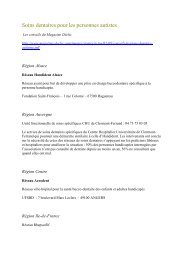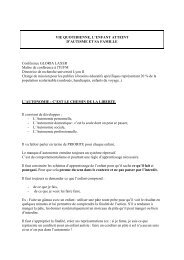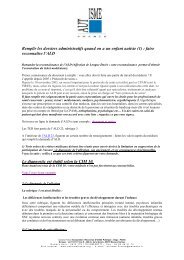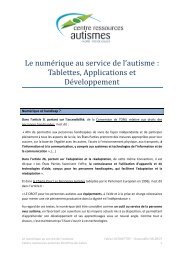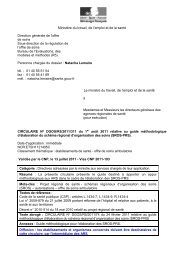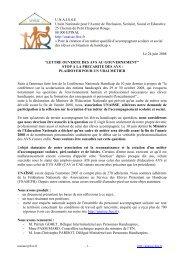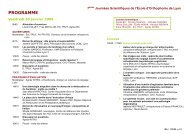I Données issues des expertises collectives - Autistes dans la cité
I Données issues des expertises collectives - Autistes dans la cité
I Données issues des expertises collectives - Autistes dans la cité
Create successful ePaper yourself
Turn your PDF publications into a flip-book with our unique Google optimized e-Paper software.
Dyslexie, dyscalculie, dysorthographie<br />
Chapitre V (F) : Troubles mentaux et troubles du comportement. Critère de<br />
diagnostique pour <strong>la</strong> recherche. OMS, Masson, 1994 : 132-135<br />
OSTAD SA. Cognitive subtraction in a developmental perspective: Accuracy,<br />
speed-of-processing and strategy-use differences in normal and mathematically<br />
disabled children. Focuq on Leraning Problems in Mathematics 2000, 22 : 18-31<br />
OSTAD SA. Developmental differences in addition strategies: A comparison of<br />
mathematically disabled and mathematically normal children. British Journal of<br />
Educational Psychology 1997, 67 : 345-357<br />
OSTAD SE. Comorbidity between mathematics and spelling difficulties. Logopedics<br />
Phoniatrics Vocology 1998, 23 : 145-154<br />
OSTAD SA. Developmental progression of subtraction strategies: A comparison of<br />
mathematically normal mathematically disabled children. European Journal of Special<br />
Needs Education 1999, 14 : 21-36<br />
PAULESU E, DEMONET JF, FAZIO F, MCCRORY E, CHANOINE V, et coll. Dyslexia:<br />
cultural diversity and biological unity. Science 2001, 291 : 2165-2167<br />
PERFETTI CA, ZHANG S. The universal word identification reflex. In : The psychology<br />
of learning and motivation. MEDIN DL (ed). Vol 33, Academic Press, San Diego,<br />
1995 : 159-189<br />
PLAZA M, CHAUVIN D, LANTHIER O, RIGOARD M-T, ROUSTIT J, et coll. Validation<br />
longitudinale d’un outil de dépistage <strong>des</strong> troubles du <strong>la</strong>ngage écrit. Étude d’une<br />
cohorte d’enfants dépistés en fin de CP et réévalués en fin de CE1. Glossa 2002, 81 :<br />
22-33<br />
RODGERS B. The identification and prevalence of specific reading retardation.<br />
British Journal of Educational Psychology 1983, 53 : 369-373<br />
ROURKE BP. Arithmetic disabilities, specific and otherwise: A neuropsychological<br />
perspective. Journal of Learning disabilities 1993, 26 : 214-226<br />
ROURKE BP, STRANG JD. Neuropsychological significance of variations in patterns of<br />
academic performance : Motor, psychomotor, and tactile perception-abilities.<br />
Journal of Pediatric Psychology 1978, 3 : 212-225<br />
RUTTER M. Dyslexia. In : Dyslexia : An appraisal of current knowledge. BENTON AL,<br />
PEARL D (eds). Oxford Univ. Press, 1978<br />
RUTTER M, CASPI A, FERGUSSON D, HORWOOD LJ, GOODMAN R, et coll. Sex<br />
differences in developmental reading disability: new findings from 4 epidemiological<br />
studies. Jama 2004, 291 : 2007-2012<br />
SCARBOUROUGH HS. Connecting early <strong>la</strong>nguage and literacy to <strong>la</strong>ter reading<br />
(dis)abilities: evidence, theory, and practice. In : Handbook of early literacy<br />
research. NEUMAN SB, DIKINSON DK (eds). Guildford Press, New York, 2001 : 97-110<br />
SHALEV RS, GROSS-TSUR V. Developmental dyscalculia. Pediatr Neurol 2001, 24 :<br />
337-342<br />
77<br />
ANALYSE



